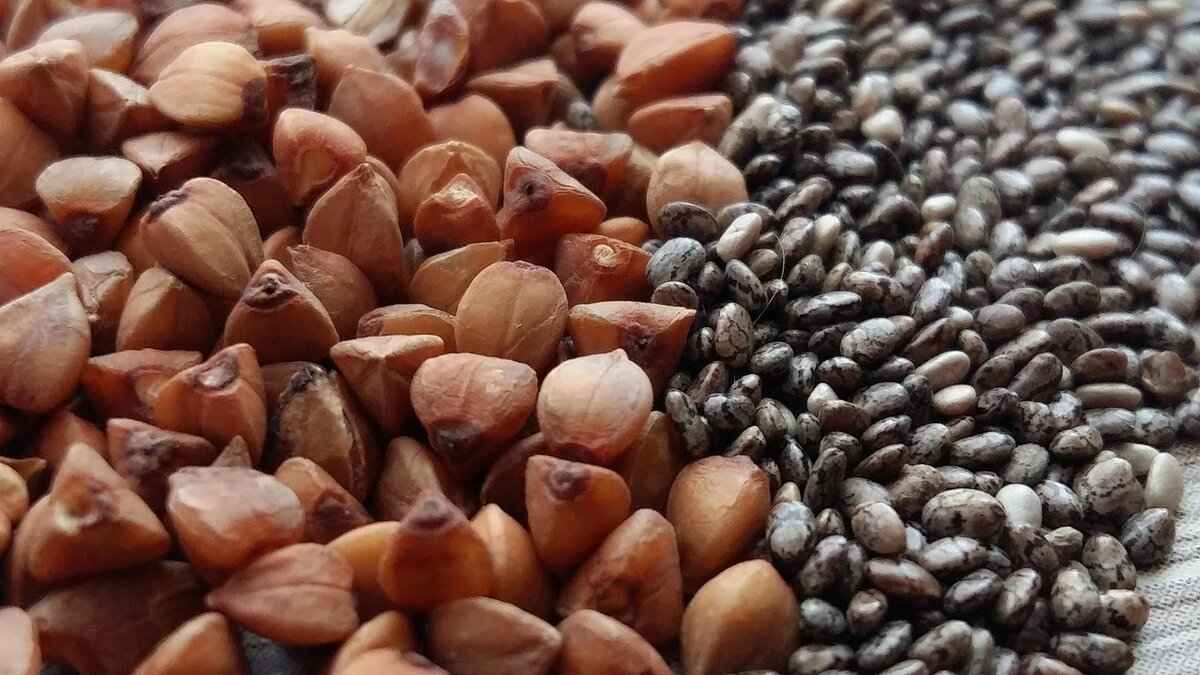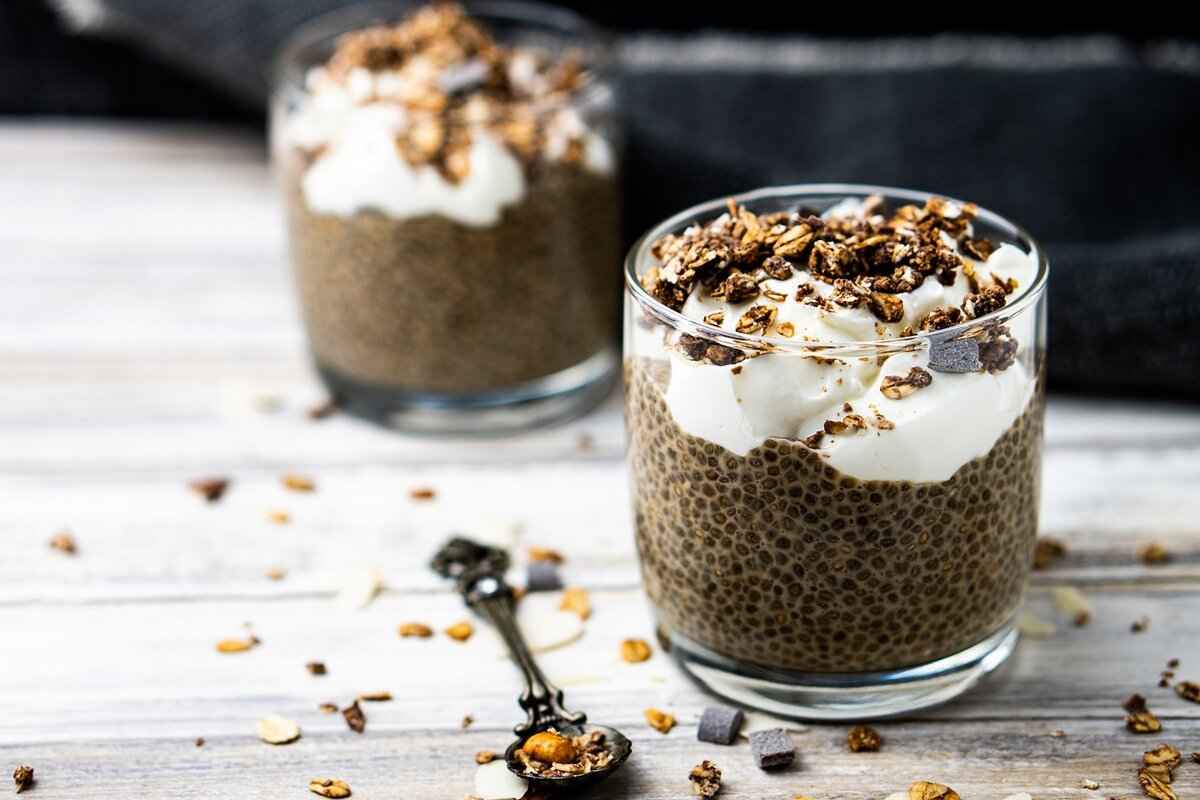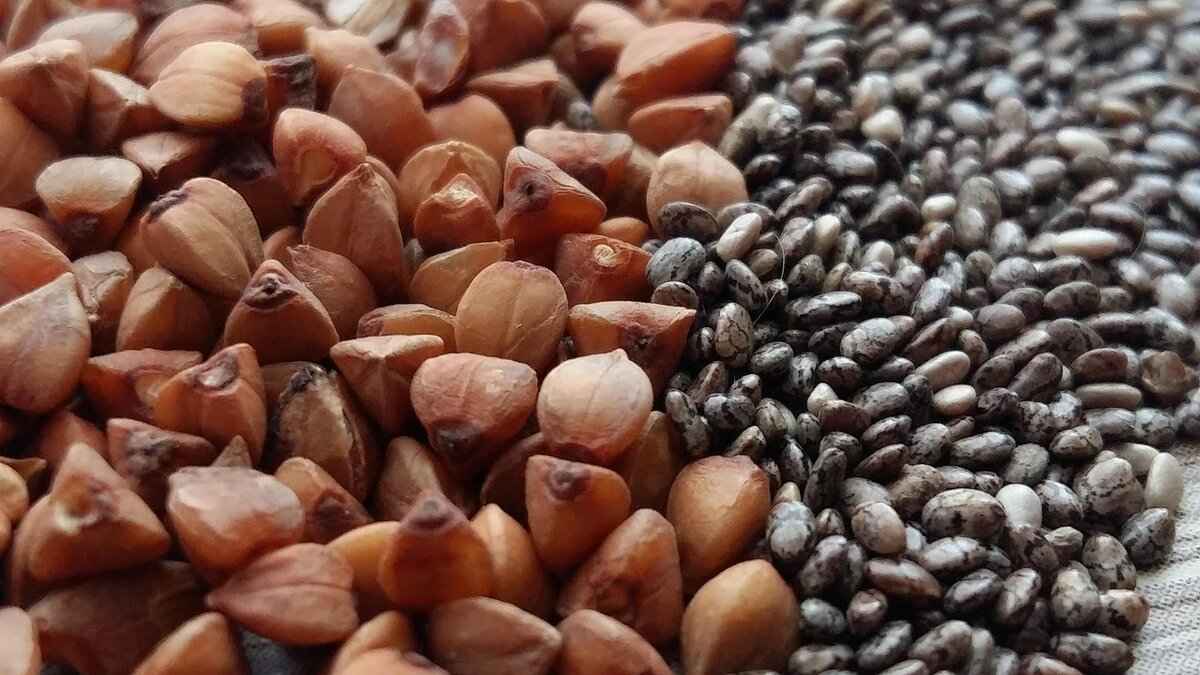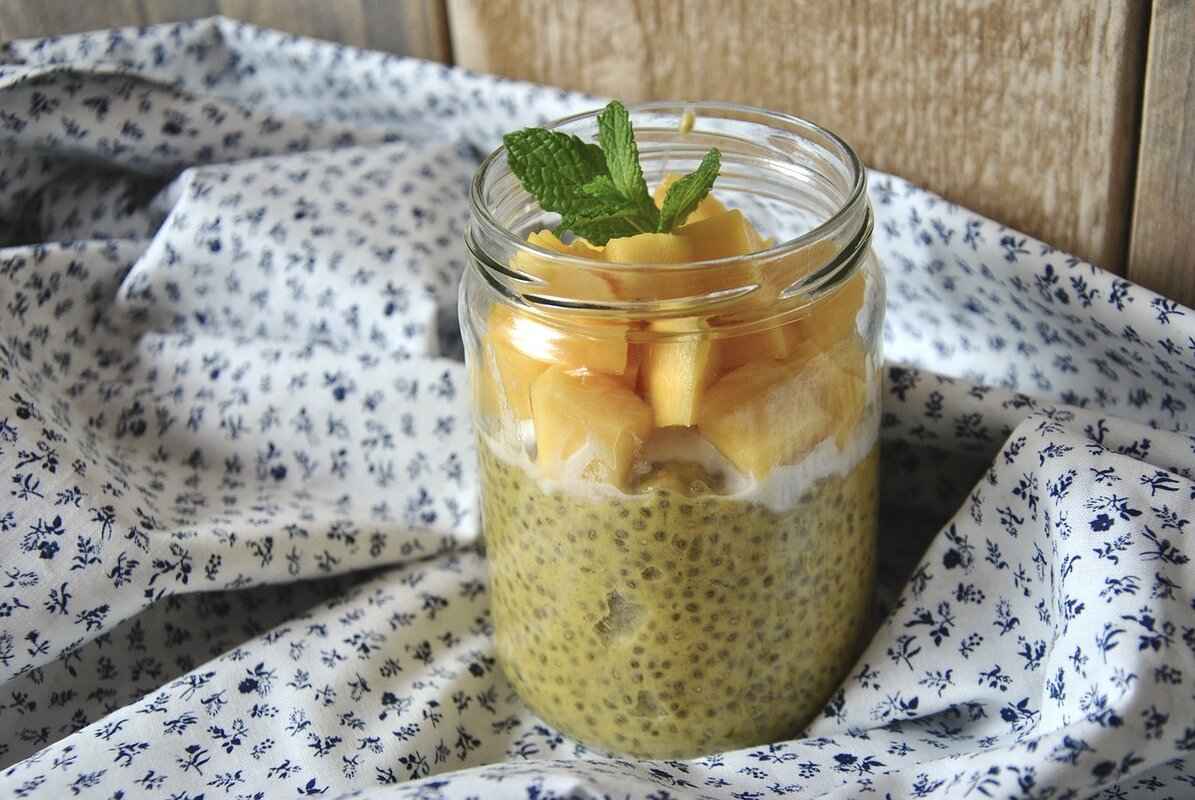This article explores the calorie content of chia seeds, their nutritional benefits, and how they can be incorporated into various diets for optimal health and wellness.
What Are Chia Seeds?
Chia seeds are tiny, nutrient-rich seeds derived from the Salvia hispanica plant. These seeds have gained popularity as a superfood due to their high content of fiber, omega-3 fatty acids, and essential nutrients. They can absorb water and expand, forming a gel-like consistency, which makes them a unique addition to many dishes.
How Many Calories Are in 1 Tablespoon of Chia Seeds?
One tablespoon of chia seeds contains approximately 58 calories. This low caloric content makes them an excellent choice for those looking to manage their weight while still obtaining essential nutrients. Understanding these calories can help individuals maintain a balanced diet.
What Nutrients Are Found in Chia Seeds?
Chia seeds are packed with essential nutrients, including:
- Fiber: Aids in digestion and promotes satiety.
- Protein: Important for muscle repair and growth.
- Healthy Fats: Rich in omega-3 fatty acids, beneficial for heart health.
- Vitamins and Minerals: Includes calcium, magnesium, and phosphorus.
How Do Chia Seeds Contribute to Weight Management?
Due to their high fiber content, chia seeds can promote feelings of fullness, potentially aiding in weight management. When consumed, they absorb liquid and expand, which may help reduce hunger and prevent overeating.
Are Chia Seeds Good for Heart Health?
Chia seeds are rich in omega-3 fatty acids, which are beneficial for heart health. Regular consumption can help lower cholesterol levels, reduce inflammation, and improve overall cardiovascular function.
How Can You Incorporate Chia Seeds into Your Diet?
Chia seeds are versatile and can be added to:
- Smoothies
- Yogurt
- Oatmeal
- Baked goods
They can also be used to make chia pudding by soaking them in milk or a plant-based alternative overnight.
What Are the Potential Health Benefits of Chia Seeds?
Beyond their caloric content, chia seeds offer various health benefits, including:
- Improved Digestion: The high fiber content aids in regular bowel movements.
- Enhanced Energy Levels: Provides a steady source of energy, making them ideal for athletes.
Are There Any Risks Associated with Chia Seed Consumption?
While chia seeds are generally safe for most people, some individuals may experience digestive discomfort if consumed in large quantities. It’s advisable to start with small amounts and gradually increase intake while ensuring adequate hydration.
How Do Chia Seeds Compare to Other Seeds?
Chia seeds are often compared to flaxseeds and hemp seeds. While all three are nutritious, chia seeds have a higher fiber content and are easier to digest. This section analyzes the nutritional differences and health benefits of these popular seeds.
What Do Experts Say About Chia Seeds?
Nutritionists and health experts frequently praise chia seeds for their health benefits. They recommend incorporating them into a balanced diet for their numerous advantages, including heart health and weight management.

What Are Chia Seeds?
Chia seeds are tiny, yet incredibly nutrient-dense seeds that come from the Salvia hispanica plant, which is native to Central America. These seeds have been a staple in the diets of ancient civilizations, such as the Aztecs and Mayans, who recognized their health benefits and used them as a source of energy and stamina. Today, chia seeds have gained immense popularity as a modern superfood, celebrated for their impressive nutritional profile.
One of the most remarkable features of chia seeds is their high content of fiber. Just one ounce (approximately 28 grams) of chia seeds contains about 11 grams of fiber, which is essential for maintaining a healthy digestive system. This high fiber content not only promotes regularity but also helps to create a feeling of fullness, making chia seeds an excellent addition to weight management strategies.
In addition to fiber, chia seeds are also a rich source of omega-3 fatty acids. These essential fats are vital for brain health and have been linked to a reduced risk of heart disease. Omega-3 fatty acids are known to have anti-inflammatory properties, which can benefit overall health. Chia seeds are particularly unique because they provide a plant-based source of omega-3s, making them a great option for vegetarians and vegans.
Furthermore, chia seeds are packed with a variety of essential nutrients. They contain protein, which is important for muscle repair and growth, as well as several key vitamins and minerals such as calcium, magnesium, and phosphorus. These nutrients contribute to the overall health benefits associated with chia seeds, making them a valuable addition to any diet.
Chia seeds are incredibly versatile and can be easily incorporated into various meals. They can be added to smoothies, yogurt, oatmeal, and even baked goods. When mixed with liquid, chia seeds absorb water and expand, forming a gel-like consistency. This property makes them an excellent thickening agent for puddings and sauces, adding both texture and nutritional value.
In summary, chia seeds are not just a trendy health food; they are a powerhouse of nutrition. Their high fiber and omega-3 fatty acid content, combined with their versatility in cooking, make them an ideal ingredient for anyone looking to improve their diet. As more people become aware of their health benefits, chia seeds continue to solidify their status as a top superfood.

How Many Calories Are in 1 Tablespoon of Chia Seeds?
Chia seeds have gained immense popularity as a superfood in recent years, thanks to their impressive nutritional profile and versatility in various dishes. Among their many benefits, understanding their caloric content is essential for anyone looking to maintain a balanced diet. This article delves into the specifics of how many calories are found in one tablespoon of chia seeds and how this fits into your overall dietary goals.
One tablespoon of chia seeds contains approximately 58 calories. This relatively low caloric content makes chia seeds a great addition to meals without significantly increasing your daily caloric intake. By knowing the caloric value, individuals can better manage their daily consumption, ensuring that they stay within their caloric goals while still enjoying nutritious foods.
Why Are Chia Seeds Considered a Superfood?
Chia seeds are not just low in calories; they are also packed with essential nutrients. In addition to their caloric content, they are rich in fiber, protein, and healthy fats, particularly omega-3 fatty acids. This combination of nutrients contributes to their reputation as a superfood, promoting overall health and wellness.
How Do Chia Seeds Fit into a Balanced Diet?
- Fiber Content: Chia seeds are an excellent source of dietary fiber, which can aid in digestion and promote a feeling of fullness.
- Protein Source: The protein content in chia seeds can help in muscle repair and growth, making them beneficial for those who are physically active.
- Healthy Fats: The omega-3 fatty acids in chia seeds are known for their heart health benefits, including reducing inflammation and lowering cholesterol levels.
How Can You Incorporate Chia Seeds into Your Daily Meals?
Incorporating chia seeds into your diet is easy and can enhance the nutritional value of various dishes. Here are some practical ways to include them:
- Add them to smoothies for a nutrient boost.
- Mix them into yogurt or oatmeal for added texture and health benefits.
- Use them in baking, such as in muffins or bread, to increase fiber content.
- Prepare chia pudding by soaking them in milk or a milk alternative overnight.
What Are the Health Benefits Beyond Calories?
Aside from their caloric content, chia seeds offer numerous health benefits. Regular consumption can lead to improved digestion, enhanced energy levels, and even better skin health. The antioxidants present in chia seeds help combat oxidative stress, further promoting overall well-being.
Are There Any Risks Associated with Chia Seed Consumption?
While chia seeds are generally safe for most people, some may experience digestive discomfort if consumed in large quantities. It is advisable to start with a small amount and gradually increase intake, ensuring adequate hydration to help the seeds expand in the stomach.
How Do Chia Seeds Compare to Other Seeds?
When comparing chia seeds to other popular seeds like flaxseeds and hemp seeds, chia seeds stand out due to their unique nutritional profile. They contain more fiber than flaxseeds and offer a more balanced ratio of omega-3 to omega-6 fatty acids compared to hemp seeds.
In summary, one tablespoon of chia seeds, containing approximately 58 calories, can be a valuable addition to a balanced diet. Their nutrient density and versatility make them an ideal choice for health-conscious individuals looking to enhance their meals without compromising on flavor or nutrition.

What Nutrients Are Found in Chia Seeds?
Chia seeds, derived from the Salvia hispanica plant, have gained immense popularity in recent years due to their impressive nutritional profile. These tiny seeds are often hailed as a superfood because they are loaded with essential nutrients that can contribute significantly to a healthy diet.
Chia seeds are remarkably nutrient-dense, providing a wealth of health benefits in a small serving size. Here’s a closer look at the key nutrients found in these versatile seeds:
- Fiber: One of the standout features of chia seeds is their high fiber content. Just one ounce (about two tablespoons) contains approximately 11 grams of fiber, which is about 30% of the recommended daily intake. This fiber aids in digestion, promotes regularity, and can help maintain a healthy weight by promoting feelings of fullness.
- Protein: Chia seeds are a good source of plant-based protein, offering around 4 grams per two tablespoons. This makes them an excellent addition to vegetarian and vegan diets, helping to meet daily protein needs.
- Healthy Fats: These seeds are rich in omega-3 fatty acids, particularly alpha-linolenic acid (ALA). Just two tablespoons provide about 5 grams of omega-3s, which are known for their anti-inflammatory properties and benefits to heart health.
- Vitamins and Minerals: Chia seeds are a source of several important vitamins and minerals, including calcium, magnesium, phosphorus, and manganese. For instance, they contain about 18% of the daily recommended intake of calcium in just one ounce, contributing to bone health.
- Antioxidants: In addition to vitamins and minerals, chia seeds are rich in antioxidants that help combat oxidative stress and inflammation in the body. These compounds can protect the body from free radical damage.
These nutrients work synergistically to provide numerous health benefits. The high fiber content not only aids digestion but also regulates blood sugar levels and supports heart health. The combination of protein and healthy fats can promote satiety, making chia seeds an excellent addition to meals for those looking to manage their weight.
Moreover, the presence of antioxidants contributes to overall wellness by helping to reduce the risk of chronic diseases. Regular consumption of chia seeds can therefore support a balanced diet and enhance overall health.
In summary, chia seeds are not just a trendy health food; they are a powerhouse of essential nutrients that can play a vital role in a healthy diet. Their versatility allows them to be easily incorporated into various meals, making it simple to reap their numerous benefits.

How Do Chia Seeds Contribute to Weight Management?
Chia seeds have gained immense popularity in recent years, particularly among those seeking to manage their weight effectively. Their unique properties make them a valuable addition to a balanced diet, especially for individuals looking to shed a few pounds. In this section, we will delve into how chia seeds contribute to weight management and why they should be considered a staple in your weight-loss strategy.
One of the primary reasons chia seeds are effective for weight management is their high fiber content. A single tablespoon of chia seeds contains about 5 grams of fiber, which is approximately 20% of the daily recommended intake for adults. Fiber plays a crucial role in promoting feelings of fullness and satiety, which can help curb overeating and unnecessary snacking.
When chia seeds are mixed with liquid, they can absorb up to 12 times their weight, forming a gel-like consistency. This phenomenon not only increases their volume but also slows down the digestion process. As a result, individuals may feel fuller for longer periods, reducing the overall caloric intake throughout the day. This mechanism can be particularly beneficial for those following a calorie-restricted diet.
- Breakfast Boost: Add chia seeds to your morning oatmeal or yogurt to enhance fiber content and keep you satisfied until lunch.
- Smoothie Supplement: Blend chia seeds into your smoothies for a nutritious boost without adding many calories.
- Baking Ingredient: Incorporate chia seeds into baked goods like muffins or bread for added texture and health benefits.
Compared to other weight-loss foods, chia seeds stand out due to their unique combination of fiber, protein, and healthy fats. While many weight-loss foods may focus solely on low calories, chia seeds provide essential nutrients that support overall health. This nutrient density means that you can enjoy chia seeds as a snack or meal component without compromising your nutritional intake.
Nutritionists emphasize that chia seeds should not be viewed as a miracle weight-loss solution but rather as a part of a comprehensive weight management plan. According to registered dietitian Jane Doe, “Incorporating chia seeds into a balanced diet can enhance satiety and provide essential nutrients that support overall health.” This perspective highlights the importance of viewing chia seeds as a complementary element rather than a standalone solution.
While chia seeds offer numerous benefits, it is essential to consume them in moderation. Overconsumption may lead to digestive discomfort, such as bloating or gas. It is advisable to start with a small amount and gradually increase your intake to allow your digestive system to adjust. Additionally, staying hydrated is crucial, as chia seeds absorb water and can lead to dehydration if not consumed with adequate fluid.
In summary, chia seeds are a powerful ally in the quest for effective weight management. Their ability to promote fullness, combined with their nutritional benefits, makes them an excellent addition to any diet. By incorporating chia seeds into meals and snacks, individuals can enhance their weight-loss efforts while enjoying the myriad health benefits these tiny seeds offer.

Are Chia Seeds Good for Heart Health?
Chia seeds, small yet powerful, have gained significant attention in the health community for their impressive nutritional profile. One of the most notable benefits of these tiny seeds is their richness in omega-3 fatty acids, which play a crucial role in promoting heart health. This section delves into the cardiovascular advantages associated with regular chia seed consumption, providing insights into how they can contribute to a healthier heart.
What Are Omega-3 Fatty Acids?
Omega-3 fatty acids are essential fats that the body cannot produce on its own, making it necessary to obtain them through diet. These fatty acids are known for their anti-inflammatory properties and are linked to numerous health benefits, particularly for the heart. The primary types of omega-3s found in chia seeds include alpha-linolenic acid (ALA), which has been shown to reduce the risk of heart disease.
How Do Chia Seeds Benefit Heart Health?
- Reducing Inflammation: Chronic inflammation is a significant risk factor for heart disease. The omega-3s in chia seeds help combat inflammation, thereby lowering the risk of cardiovascular issues.
- Lowering Cholesterol Levels: Studies suggest that chia seeds can help lower levels of LDL (bad) cholesterol while raising HDL (good) cholesterol, promoting a healthier lipid profile.
- Regulating Blood Pressure: Regular consumption of chia seeds may assist in maintaining healthy blood pressure levels, a vital factor in preventing heart-related conditions.
- Improving Blood Sugar Control: Chia seeds can help stabilize blood sugar levels, which is important for heart health, especially for individuals with diabetes.
How Can You Incorporate Chia Seeds for Heart Health?
Incorporating chia seeds into your diet is simple and versatile. Here are some practical tips:
- Add chia seeds to your smoothies for a nutrient boost.
- Mix them into yogurt or oatmeal for added texture and health benefits.
- Use chia seeds as a thickening agent in sauces or puddings.
- Sprinkle them on salads for a crunchy topping.
What Do Experts Say About Chia Seeds and Heart Health?
Nutritionists and health experts often recommend chia seeds as part of a balanced diet. According to research, incorporating sources of omega-3 fatty acids like chia seeds can significantly improve heart health outcomes. Their high fiber content also aids in digestion and contributes to overall wellness.
Final Thoughts
With their rich omega-3 fatty acid content and various heart health benefits, chia seeds are a valuable addition to any diet. Regular consumption can lead to improved cardiovascular health, making them a simple yet effective way to enhance your overall well-being. Embrace the power of chia seeds and take a step towards a healthier heart!

How Can You Incorporate Chia Seeds into Your Diet?
Chia seeds are not only a nutritional powerhouse but also incredibly versatile, making them easy to incorporate into a variety of meals. With their subtle nutty flavor and unique texture, these tiny seeds can enhance your dishes while boosting their health benefits. Here are some practical tips to seamlessly add chia seeds into your daily diet.
- Smoothies: One of the easiest ways to include chia seeds is by adding them to your morning smoothie. Simply blend a tablespoon of chia seeds with your favorite fruits, vegetables, and a liquid base such as almond milk or yogurt. This not only thickens your smoothie but also adds a dose of fiber and omega-3 fatty acids.
- Yogurt: Stirring chia seeds into yogurt is a quick and nutritious breakfast option. You can mix them in plain or flavored yogurt, and for added flavor, top with fresh fruits, nuts, or honey. This combination creates a satisfying snack that keeps you full longer.
- Oatmeal: Enhance your morning oatmeal by mixing in chia seeds. You can add them to the cooking process or sprinkle them on top just before serving. This not only boosts the nutritional content but also adds a delightful crunch.
- Baked Goods: Chia seeds can be incorporated into various baked goods such as muffins, bread, or pancakes. Substitute a portion of the flour with ground chia seeds or add whole seeds to the batter. This makes your treats healthier without compromising on taste.
- Chia Pudding: Create a delicious chia pudding by mixing chia seeds with your choice of milk and sweetener. Let it sit overnight in the refrigerator to thicken. In the morning, you can top it with fruits, nuts, or granola for a delightful breakfast or dessert.
Furthermore, chia seeds can also be sprinkled on salads, soups, or even mixed into sauces for a nutritional boost. Their ability to absorb liquid makes them a fantastic thickening agent, which can enhance the texture of various dishes.
When incorporating chia seeds into your diet, it’s important to start with small amounts, especially if you are not accustomed to high-fiber foods. Gradually increasing your intake can help your digestive system adjust without discomfort.
In summary, chia seeds are a simple yet effective way to enhance your meals. Whether you’re looking to boost your breakfast, enrich your snacks, or add a nutritious twist to your baked goods, these seeds offer endless possibilities. With their numerous health benefits and ease of use, incorporating chia seeds into your diet can lead to improved overall health and wellness.

What Are the Potential Health Benefits of Chia Seeds?
Chia seeds, often hailed as a superfood, are not just low in calories but are also packed with a plethora of health benefits. In this section, we will explore the potential health advantages of incorporating chia seeds into your diet, focusing on their effects on digestion, energy levels, and overall well-being.
One of the standout benefits of chia seeds is their high fiber content. A single tablespoon of chia seeds contains approximately 5 grams of dietary fiber, which is essential for maintaining a healthy digestive system. Fiber promotes regular bowel movements and helps prevent constipation. Moreover, when chia seeds are soaked in liquid, they expand and form a gel-like substance, which can aid in slowing digestion and enhancing nutrient absorption.
Chia seeds are a great source of complex carbohydrates, which provide a steady release of energy. This makes them an excellent choice for athletes and active individuals looking to maintain endurance during workouts. The combination of protein, healthy fats, and fiber in chia seeds helps stabilize blood sugar levels, preventing energy crashes that can occur with high-sugar snacks. By incorporating chia seeds into your pre-workout meal, you can experience sustained energy throughout your activities.
Chia seeds are also loaded with antioxidants, which help combat oxidative stress in the body. Antioxidants play a crucial role in neutralizing free radicals, which can lead to chronic diseases and premature aging. By including chia seeds in your diet, you may enhance your body’s ability to fight inflammation and support overall health.
The omega-3 fatty acids found in chia seeds are known to promote heart health. These essential fats can help lower bad cholesterol levels (LDL) while increasing good cholesterol levels (HDL). Regular consumption of chia seeds may contribute to a reduced risk of heart disease by improving blood pressure and reducing inflammation. Including chia seeds in your diet is a simple yet effective way to support cardiovascular health.
Due to their high fiber and protein content, chia seeds can promote feelings of fullness, which may help in weight management. When consumed, they absorb water and expand in the stomach, leading to increased satiety. This can be particularly beneficial for those looking to control their appetite and reduce overall caloric intake. Adding chia seeds to meals can make it easier to stick to a healthy eating plan.
Chia seeds are a good source of several nutrients crucial for bone health, including calcium, phosphorus, and magnesium. Calcium is vital for maintaining strong bones, and just one ounce of chia seeds provides about 18% of the recommended daily intake. Including chia seeds in your diet can support bone density and overall skeletal health.
- Add chia seeds to smoothies for a nutrient boost.
- Mix them into yogurt or oatmeal for added texture and health benefits.
- Use chia seeds as an egg substitute in baking.
- Sprinkle them on salads for a crunchy topping.
In summary, chia seeds offer a multitude of health benefits that extend beyond their calorie content. From improving digestion and enhancing energy levels to supporting heart and bone health, these tiny seeds can be a powerful addition to a balanced diet. By understanding their potential advantages, you can make informed choices about incorporating chia seeds into your meals for optimal health.

Are There Any Risks Associated with Chia Seed Consumption?
Chia seeds have gained immense popularity as a superfood due to their numerous health benefits. However, it is essential to consider that, while they are generally safe for most people, some individuals may experience digestive discomfort when consuming them. This section delves into the potential risks associated with chia seed consumption and offers practical advice on how to mitigate these issues.
Chia seeds are incredibly high in fiber, with one ounce containing about 11 grams. This fiber content can be beneficial for digestive health, but it can also lead to discomfort if consumed in excess or without adequate hydration. Some individuals may experience symptoms such as bloating, gas, or even constipation. This is particularly true for those who are not used to a high-fiber diet.
- Start Slowly: If you are new to chia seeds, begin with a small amount, such as one teaspoon, and gradually increase your intake. This allows your digestive system to adjust to the additional fiber.
- Hydrate Adequately: Chia seeds can absorb up to 10-12 times their weight in water. It is crucial to drink plenty of fluids when consuming chia seeds to prevent dehydration and digestive discomfort.
- Soak Before Consumption: Soaking chia seeds in water or other liquids for at least 30 minutes before eating can help them expand and become easier to digest. This also enhances their nutrient absorption.
- Monitor Your Body’s Response: Pay attention to how your body reacts after consuming chia seeds. If you notice persistent discomfort, consider reducing your intake or consulting a healthcare professional.
While rare, some individuals may have an allergy to chia seeds. Symptoms can include itching, swelling, or difficulty breathing. If you have a history of allergies to other seeds, it may be wise to approach chia seeds with caution. Additionally, chia seeds can interact with certain medications, particularly blood thinners, due to their omega-3 fatty acid content. Always consult with a healthcare provider if you are on medication.
Individuals with certain medical conditions, such as irritable bowel syndrome (IBS) or other gastrointestinal disorders, may want to avoid chia seeds or consume them in very limited quantities. Pregnant or breastfeeding women should also consult their healthcare provider before adding chia seeds to their diet, as individual nutritional needs can vary.
In summary, while chia seeds are a nutritious addition to many diets, it is crucial to be aware of the potential risks associated with their consumption. By starting slowly, staying hydrated, and monitoring your body’s response, you can enjoy the health benefits of chia seeds while minimizing the risk of digestive discomfort. As always, if you have specific health concerns, consult with a healthcare professional for personalized advice.

How Do Chia Seeds Compare to Other Seeds?
When it comes to superfoods, chia seeds often take the spotlight due to their impressive nutritional profile. However, they are frequently compared to other seeds like flaxseeds and hemp seeds. This article will delve into the nutritional differences and health benefits of these popular seeds, helping you make informed dietary choices.
Chia seeds, flaxseeds, and hemp seeds each offer unique nutritional benefits:
- Chia Seeds: Rich in fiber, omega-3 fatty acids, and antioxidants, one ounce (about 28 grams) of chia seeds contains approximately 138 calories, 11 grams of fiber, and 5 grams of protein.
- Flaxseeds: Known for their high content of lignans and omega-3s, flaxseeds provide about 150 calories per ounce, with 8 grams of fiber and 6 grams of protein.
- Hemp Seeds: These seeds are excellent sources of protein and essential fatty acids, offering around 160 calories per ounce, with 3 grams of fiber and 9 grams of protein.
Each type of seed comes with its own set of health benefits:
- Chia Seeds: The high fiber content aids in digestion and promotes a feeling of fullness, which can be beneficial for weight management. Additionally, chia seeds are known to support heart health due to their omega-3 fatty acids.
- Flaxseeds: These seeds are particularly noted for their potential in reducing the risk of certain cancers, thanks to their lignan content. They also support heart health and may help lower cholesterol levels.
- Hemp Seeds: Hemp seeds are a complete source of protein, containing all nine essential amino acids. They are also rich in gamma-linolenic acid (GLA), which has anti-inflammatory properties.
Incorporating these seeds into your diet can be simple and versatile:
- Chia Seeds: Use them in smoothies, oatmeal, or as a thickening agent in recipes. They can also be soaked in water to create a gel-like consistency.
- Flaxseeds: Ground flaxseeds can be added to baked goods, smoothies, or yogurt. It’s important to consume them ground, as whole flaxseeds may pass through the digestive system undigested.
- Hemp Seeds: Sprinkle hemp seeds on salads, blend them into smoothies, or incorporate them into energy bars for an added protein boost.
While chia, flax, and hemp seeds are generally safe for most individuals, there are a few considerations:
- Chia Seeds: Due to their high fiber content, excessive consumption may lead to digestive discomfort. It’s advisable to gradually increase intake.
- Flaxseeds: They should be consumed in moderation, as high amounts may lead to digestive issues or interfere with nutrient absorption.
- Hemp Seeds: While safe for most, those with allergies to cannabis should avoid hemp seeds.
In summary, while chia seeds, flaxseeds, and hemp seeds each offer unique nutritional profiles and health benefits, they can all play a valuable role in a balanced diet. Understanding their differences allows you to choose the right seeds to meet your health goals.

What Do Experts Say About Chia Seeds?
When it comes to nutritional powerhouses, chia seeds are often at the forefront of discussions among health professionals. These tiny seeds, rich in nutrients, have garnered attention from nutritionists and health experts alike, who frequently highlight their numerous benefits. This section compiles various insights and recommendations from professionals in the field, shedding light on why chia seeds have earned their superfood status.
According to experts, chia seeds are packed with essential nutrients that contribute to overall health. They are an excellent source of fiber, which aids in digestion and promotes a feeling of fullness. Additionally, these seeds are rich in omega-3 fatty acids, known for their heart health benefits. Many nutritionists recommend incorporating chia seeds into daily diets to enhance nutrient intake.
Health experts often suggest that individuals include chia seeds as part of a balanced diet. Registered dietitian Jane Doe states, “Chia seeds are a fantastic addition to smoothies, salads, and even baked goods. Their ability to absorb liquid makes them a versatile ingredient.” This versatility allows for easy integration into various meals, making it simple to reap their benefits.
Many nutritionists emphasize the role of chia seeds in weight management. Due to their high fiber content, they can help control appetite and reduce overall calorie intake. Health coach John Smith explains, “Incorporating chia seeds into your meals can help you feel fuller longer, which is crucial for those looking to manage their weight.” This makes chia seeds a valuable tool for anyone aiming to maintain a healthy lifestyle.
Chia seeds are particularly noted for their heart health benefits. Experts highlight that the omega-3 fatty acids found in chia seeds can help lower cholesterol levels and reduce the risk of heart disease. Cardiologist Dr. Emily Johnson shares, “Regular consumption of chia seeds can lead to improved cardiovascular health, making them an excellent choice for heart-conscious individuals.”
While chia seeds are generally safe for most people, some health experts caution that excessive consumption may lead to digestive discomfort. Nutritionist Sarah Lee advises, “Start with small amounts and gradually increase your intake to allow your digestive system to adjust.” By doing so, individuals can enjoy the benefits of chia seeds without adverse effects.
Experts recommend various creative ways to incorporate chia seeds into your diet. They can be added to yogurt, oatmeal, or even used as a thickening agent in soups and sauces. Chef Mark Thompson suggests, “Try making a chia seed pudding by soaking the seeds in almond milk overnight. It’s a delicious and nutritious breakfast option!” This adaptability makes chia seeds a favorite among health enthusiasts.
In summary, nutritionists and health experts universally praise chia seeds for their nutritional benefits and versatility. With their rich nutrient profile, they offer numerous health advantages, from promoting heart health to aiding in weight management. Incorporating these seeds into your daily diet can be a simple yet effective way to enhance your overall health.
Frequently Asked Questions
- What are the health benefits of chia seeds?
Chia seeds are packed with nutrients like fiber, protein, and omega-3 fatty acids, which can help improve digestion, boost heart health, and even support weight management. They’re like little powerhouses of nutrition!
- How can I add chia seeds to my meals?
You can sprinkle chia seeds on yogurt, mix them into smoothies, or even add them to your oatmeal. They can also be used in baking or as a thickening agent in puddings. The options are endless!
- Are there any side effects of consuming chia seeds?
While chia seeds are generally safe, some people may experience digestive discomfort if they consume too many at once. It’s best to start with a small amount and increase gradually to see how your body reacts.
- How do chia seeds compare to flaxseeds?
Both chia seeds and flaxseeds are nutritious, but chia seeds have a higher fiber content and can absorb more water, making them great for hydration. Flaxseeds, on the other hand, are higher in omega-3 fatty acids. Each has its unique benefits!
- Can chia seeds help with weight loss?
Yes! The high fiber content in chia seeds can help you feel full longer, which may reduce overall calorie intake. They can be a great addition to a weight loss strategy when used wisely.














